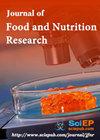印度南部普杜切里地区肺结核患者的饮食摄入和营养状况
IF 0.6
4区 农林科学
Q4 FOOD SCIENCE & TECHNOLOGY
引用次数: 0
摘要
结核病(TB)与营养之间存在着双向关系。检查结核病患者的饮食摄入量,并确定与饮食不足相关的因素。在这项横断面研究中,纳入了173名新诊断的痰涂片阳性结核病患者,并在国家消除结核病规划(NTEP)中接受治疗。通过一天24小时膳食回顾评估营养摄入量,并与推荐膳食允取量(RDA)进行比较。膳食摄入数据使用DietSoft软件进行分析。研究参与者的平均(SD)年龄为45.5(18.7)岁,大多数为男性(73.4%)。超过三分之一(35.3%)的人没有接受过任何正规教育,28%的人失业。近一半(47%)患有糖尿病,45.1%酗酒,39.3%吸烟,36%体重不足。平均每日能量摄取量为1414.33 (458.45)kcal,蛋白质摄取量中位数为43.15 (30.00-60.26)gms。每日能量和蛋白质摄入量低于国家RDA指南。微量营养素的摄取量远低于推荐量。结核病患者大量营养素和选定微量营养素的摄入严重不足。在补充维生素的同时,这一人群也需要饮食咨询。关键词:膳食摄入;营养状况;危险行为本文章由计算机程序翻译,如有差异,请以英文原文为准。
Dietary Intake and Nutritional Status of Patients with Pulmonary Tuberculosis in Puducherry, South India
A bidirectional relationship exists between tuberculosis (TB) and nutrition. To examine the dietary intakes of tuberculosis (TB) patients and to identify the factors associated with dietary deficiencies. In this cross-sectional study, 173 newly diagnosed sputum smear-positive TB patients, and taking treatment in the National Tuberculosis Elimination Programme (NTEP) were included. Nutrient intakes were evaluated through one day 24-h dietary recall and compared with the Recommended Dietary Allowance (RDA). Data on dietary intake was analyzed using DietSoft software. The mean (SD) age of the study participants was 45.5 (18.7) years with majority male (73.4%). More than one-third (35.3%) didn’t receive any formal education and 28% were unemployed. Nearly half (47%) had diabetes mellitus, 45.1% were alcoholics, 39.3% were smokers, and 36% underweight. The mean (SD) daily intake of energy was 1414.33 (458.45) kcal and the median (Interquartile Range) of protein was 43.15 (30.00-60.26) gms. The daily energy and protein intake were lower than the national guidelines for RDA. The intake of micronutrients was found to be much lower than recommended. The intake of macronutrients and selected micronutrients in TB patients were grossly inadequate. Along with vitamin supplementation, dietary counseling also is needed in this population. Keywords: Dietary intake, Nutritional status, Risk behaviors, Tuberculosis
求助全文
通过发布文献求助,成功后即可免费获取论文全文。
去求助
来源期刊

Journal of Food and Nutrition Research
农林科学-食品科技
CiteScore
1.60
自引率
9.10%
发文量
0
审稿时长
1 months
期刊介绍:
Journal of Food and Nutrition Research (JFNR) publishes papers focusing on fundamental and applied research in chemistry, physics, microbiology, nutrition aspects, bioactivity, quality, safety, and technology of foods.
 求助内容:
求助内容: 应助结果提醒方式:
应助结果提醒方式:


